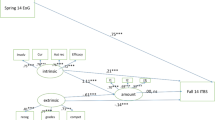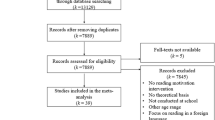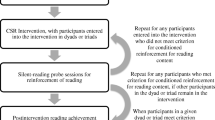Abstract
The effects of participation in the “Book it!” reading program and parental pay for reading on reported reading habits of college students was investigated. College students were surveyed about the amount they read per week, their intrinsic interest in reading, if they participated in the Book It! program and if their parents paid them money to read during childhood. If they participated in Book It! and/or were paid to read, they were also asked what effects these factors had on their learning to read, their enjoyment of reading, and on the amount they read. Neither being reinforced with money or pizzas increased or decreased the amount college students read nor influenced their intrinsic motivation for reading. Answers to direct questions about Book It! and parental pay for reading suggest that when a child is extrinsically reinforced for reading the child will increase the amount read, enjoyment of reading may increase, and if they do not yet know how to read fluently, the programs may help the child to learn to read. These results provide no support for the myth that extrinsic rewards for reading undermine intrinsic interest in reading. Rather, extrinsic rewards for reading set the conditions where intrinsic motivation for reading may develop. Any concerns that reinforcement programs for reading will decrease later reading behaviors are unfounded.
Similar content being viewed by others
References
CAMERON, J., & PIERCE, D. (1994). Reinforcement, reward, and intrinsic motivation: A meta-analysis. Review of Educational Research, 64, 363–423.
CAMERON, J., & PIERCE, D. (1996). The debate about rewards and intrinsic motivation: Protests and accusations do not alter the results. Review of Educational Research, 66, 39–51.
CARNEVALE, A. P, JOHNSON, N. C., & EDWARDS, A. R. (1998, April 10). Performance-based appropriations: Fad or wave of the future? The Chronicle of Higher Education, pp. B6, B7.
CARTON, J. S. (1996). The differential effects of tangible rewards and praise on intrinsic motivation: A comparison of cognitive evaluation theory and operant theory. The Behavior Analyst, 19, 237–255.
DANIELS, A. C. (1994). Bringing out the best in people. New York: McGraw-Hill.
DICKINSON, A. M. (1989). The detrimental effects of extrinsic reinforcement on ‘intrinsic motivation:’ The Behavior Analyst, 12, 1–15.
EISENBERGER, R., & CAMERON, J. (1996). Detrimental effects of reward: Reality or myth? American Psychologist, 51, 1153–1166.
FLORA, S. R. (1990). Undermining intrinsic interest from the standpoint of a behaviorist. The Psychological Record, 40, 323–346.
GLEISSER, M. (1998, April 10). Ltv steel co. workers to diwy up $32.6 million. The Plain Dealer, B6.
INSTITUTE OF HUMAN SCIENCE AND SERVICES OF THE UNIVERSITY OF RHODE ISLAND (1986). Pizza Hut Inc.’s The Book It national reading incentive program. Final evaluation report.
KOHN, A. (1993). Punished by rewards. Boston: Houghton Mifflin.
LINDSLEY, O. R. (1996). The four-free operant freedoms. The Behavior Analysis, 19, 199–210.
MARTIN, G., & PEAR, J. (1996). Behavior modification (5th ed.). Upper Saddle River, NJ: Prentice Hall.
MCAULEY, E., DUNCAN, T., & TAMMEN, V. V. (1989). Psychometric properties of the Intrinsic Motivation Inventory in a competitive sport setting: A confirmatory factor analysis. Research Quarterly for Exercise and Sport, 60, 48–58.
MCNINCH, G. w., STEELY, M., & DAVIDSON, T. J. (1995). Evaluating the Earning by Learning program: Changing attitudes in reading. Paper presented at the annual meeting of the Georgia Council of the International Reading Association, Atlanta, Ga.
MILLER, L. K. (1997). Principles of everyday behavior analysis (3rd. Ed.). Pacific Grove, CA: TBrooks/Cole.
Author information
Authors and Affiliations
Corresponding author
Rights and permissions
About this article
Cite this article
Flora, S.R., Flora, D.B. Effects of Extrinsic Reinforcement for Reading During Childhood on Reported Reading Habits of College Students. Psychol Rec 49, 3–14 (1999). https://doi.org/10.1007/BF03395303
Published:
Issue Date:
DOI: https://doi.org/10.1007/BF03395303




